LONDON: Britain has denied hundreds of former slaves the right to stay in the country and access support or care services, despite authorities confirming that they were trafficking victims, data published on Tuesday showed.
Government data revealed under the Freedom of Information Act found that between 2015-17, Britain’s Home Office did not allow 752 people — or about four in ten non-European victims — to remain after they were recognised as being trafficked.
All were from non-European countries such as Vietnam and Nigeria, according to the report by the British Red Cross, Hestia and Ashiana, charities that support slavery survivors.
“Modern slavery is rife in our communities and the need for long-term support is vital to ensure victims can rebuild their lives,” said Abigail Ampofo, operations director at Hestia.
“Without this support, we know that many victims are forced back into slavery and the cycle of abuse continues.” People who say they have been enslaved can enter the National Referral Mechanism and access care while the government considers their case — which can take from weeks to years.
Since February, those who are confirmed as victims receive 90 days of additional support, up from 45 days previously, the government said.
But they do not have the right to access further help thereafter, nor are they automatically given the right to stay in the country, which leaves survivors at risk of homelessness or fresh exploitation, according to anti-slavery activists.
“The situation is particularly bad for people without a secure immigration status,” said Naomi Philipps, head of policy and advocacy at British Red Cross, in a statement.
“Too often we see these people at risk of falling back into exploitation because they are unable to find somewhere to live or a way to feed themselves.” The charities urged the government to extend the support period to 12 months, and to let survivors of slavery stay in the country for at least 30 months in order to rebuild their lives.
Providing a year of assistance could boost Britain’s public purse by up to 6.6 million pounds ($8.14 million) as survivors would be more employable, and the need for medical or housing services would reduce, said Nottingham University researchers.
A Home Office spokesman said it was committed to stamping out modern slavery and supporting victims.
“We have already significantly increased support for victims earlier this year, including the length of time that an individual can receive support,” he said in emailed comments.
“We will continue to drive improvements to the services available to ensure they are meeting the recovery needs of victims.” Britain has described itself as a world leader in the anti-slavery drive, having passed the Modern Slavery Act in 2015.
About 7,000 suspected victims were uncovered in Britain last year, up a third on 2017, according to data that activists say raises concerns about the government’s ability to support them.
Published in Dawn, July 31st, 2019













































